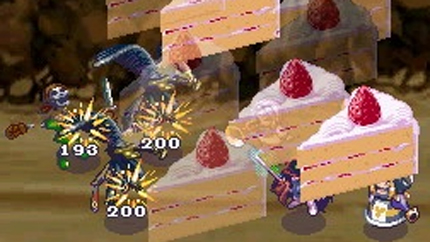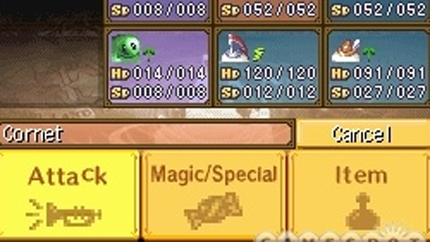Rhapsody: A Musical Adventure is a role-playing game with an acoustic twist: it relies on unique musical numbers to convey a tragic story of love and loss. Though the game is incredibly easy, places an undue emphasis on cutscenes, and boasts a woefully oversimplified battle system, developer Nippon Ichi has successfully recaptured the emotional intensity of the PlayStation original, re-creating a cult classic that still holds some limited appeal.
Rhapsody casts you as Cornet, a young peasant girl infatuated with a prince charming she has only met in her dreams. Cornet isn’t your typical love-struck ninny; she can talk to puppets with the power of her magical horn. Using this baffling power, she can secure adorable puppet allies in your quest to retrieve her one true love from the clutches of a vile witch. The cliche storyline is dull and forgettable, but the full musical segments are a real treat. These musicals provide comedic value, as well as heart-wrenching entertainment, but you're able to skip them if you want to.

Rhapsody's simple gameplay proceeds in a chapter format and follows your quest to first impress, then rescue the prince. The makes great use of stylus controls, which make investigating Cornet's world highly intuitive. A new detailed map that is always present on the top screen has also been introduced, and while a map is certainly appreciated, it vastly oversimplifies dungeons by revealing the entire floor plan of an area. This is irritating because it not only saps the fun out of intense dungeon exploration but also makes Rhapsody a virtual breeze.
The random battle system has been significantly downgraded from the PlayStation original as Rhapsody has abandoned its strategy role-playing roots in favor of straightforward turn-based brawls that lack any kind of strategic challenge whatsoever. You'll no longer have to worry about a movement field or character positioning for attacks or spells, and all your foes are pathetic and easily dispatched. This makes the game so simple that you can fly through it on auto-attack, including most boss fights, which is ridiculous. Furthermore, the rare enemy that does cause you the slightest bit of trouble is avoided with ease because Rhapsody also features an extremely high escape success rate that adds to the game's disturbingly low difficulty level. One element Nippon Ichi did not adjust pertains to Cornet's cute horn attacks, which still allow you to initiate special reward skills by filling a gauge with musical notes. This results in you slamming your enemies with flapjacks and cake, which adds to the game's adorable if quirky character.
One of Rhapsody's most annoying aspects is the sheer amount of pointless backtracking you're forced to endure; you're often forced to repeat dungeons to spur on events that return you to town, or you may be sent straight back to where you came from in another cutscene. This means you have to fend off weaker adversaries that you first met five trips ago, which is a tedious, boring endeavor. This process wouldn't be as frustrating if Rhapsody hadn't reused the same dull templates for new dungeons; as it stands, you're looking at completing various caves and towers cast in a different color, if you're lucky. Another disappointment is that the game is quite heavy on cutscenes, offering a low playtime to cutscene ratio for most of its chapters, and this is excluding musicals. For example, in one chapter, your objective is to attend the prince's birthday party, which amounts to roughly two minutes of random battles and a series of cutscenes along with a three minute song-and-dance session. This is worsened by the fact that some of the chapters are quite short, during which you spend more time in cutscenes than actually playing the game.
Rhapsody's most endearing quality by far is its soft, artistic presentation highlighted by colorful environments and adorable 2D sprites. The musical segments consist of sweet melodies sung in Japanese for an extra authentic touch, and while the voices come out relatively clear, they do seem to push the handheld's audio capabilities to the limit. Unfortunately, there is no English vocal option, but the lyrical translations remain intact from the original and are localized well. The frustrating lack of ambient sounds during most battles means that at best, you get a decent background song and some odd spellcasting sounds; at worst, you get silence. Moreover, the sound effects that Nippon Ichi did include are so subtle that you can barely hear them, which is a baffling shame for a game so focused on audio presentation.

Rhapsody may seem a bit short at just under 10 hours, but you can double or triple this amount by completing side quests or the new scenario that you unlock after completion. This is the first time that this scenario has been released outside of Japan, so it's a significant inclusion whether you're a fan or not. Also included is an encore feature that allows you to replay all musical segments, as well as a new observation feature, which offers brief character biographies that fans should find amusing. A new mic minigame has also been added to garner you a little extra cash, but the amount is so small that the minigame is a moot effort.
Rhapsody: A Musical Adventure is extremely easy and overloaded with cutscenes, but what this sweet, artistic musical RPG lacks in complexity, it makes up for in charm. If you're a big fan of the original or regret never having played it, you should definitely give this remake a look; just don't expect to find much in the way of intrigue, depth, or intensity.



